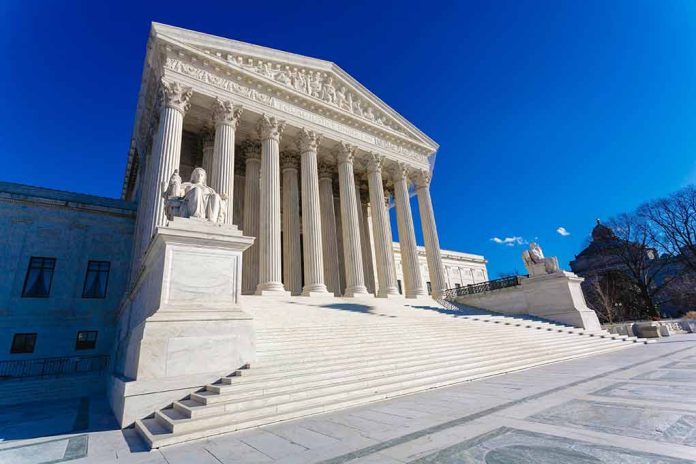
Wisconsin Supreme Court rejects attempt to remove Jill Stein from presidential ballot, sparking debate on third-party influence in close elections.
At a Glance
- Wisconsin Supreme Court declines to hear Democratic challenge against Green Party’s Jill Stein
- Democrats concerned about third-party candidates potentially aiding Republican Donald Trump
- Wisconsin has a history of close presidential elections, with four of the last six decided by narrow margins
- Stein’s presence on the ballot seen as potential factor in tight race
- Decision sparks debate on ballot access and electoral influence of third-party candidates
Court Rejects Challenge to Stein’s Ballot Presence
The Wisconsin Supreme Court has declined to hear a case that could have removed Green Party presidential candidate Jill Stein from the state’s ballot. This decision ensures Stein’s place in the upcoming election, potentially impacting the tight race in a key battleground state. The challenge, brought by a Democratic National Committee employee, argued that the Green Party lacked the necessary qualifications to nominate presidential electors due to its absence of state officeholders or legislative candidates.
The decision came without explanation, with the court simply stating, “We determine that the petitioner is not entitled to the relief he seeks.” Democrats worry that Stein’s presence on the ballot could have significant implications for the 2024 presidential race in Wisconsin, a state known for its closely contested elections. Four of the last six presidential contests in Wisconsin were decided by margins ranging from 5,700 to 23,000 votes, underscoring the potential impact of third-party candidates in tight races.
Jill Stein to appear on Wisconsin ballots after state Supreme Court denies Democratic challenge https://t.co/RN5L7nsaAV pic.twitter.com/46u3aB45XT
— New York Post (@nypost) August 27, 2024
Democrats’ Concerns and Republican Response
The Democratic challenge to Stein’s ballot presence reflects broader concerns within the party about the potential influence of third-party candidates on the upcoming election. Democrats worry that candidates like Stein could draw votes away from Vice President Kamala Harris, indirectly benefiting Republican Donald Trump. This concern is particularly acute in Wisconsin, where Stein received over 31,000 votes in 2016, exceeding Trump’s winning margin of just under 23,000 votes.
“Today justice prevailed,” Stein declared, characterizing the court’s decision as a victory against what she termed an “anti-Democratic Party’s war on democracy.” This sentiment was echoed by Michael White, co-chair of the Wisconsin Green Party, who described the complaint as baseless and motivated by political concerns rather than legal merit.
On the other side of the political aisle, Wisconsin GOP Chair Brian Schimming, celebrated the ruling, accusing Democrats of attempting to silence voters. The Republican Party of Wisconsin, along with the conservative Wisconsin Institute for Law and Liberty, had sought to intervene in the case on the Green Party’s behalf, highlighting the cross-party implications of the decision.
Implications for the 2024 Election
The court’s decision to keep Stein on the ballot comes at a time of heightened scrutiny of third-party candidates and their potential impact on close elections. With Wisconsin’s history of tight presidential races, the presence of a Green Party candidate could prove significant in determining the state’s electoral outcome.
This ruling also raises questions about ballot access and the role of minor parties in the American electoral system. While Democrats express disappointment, supporters of third-party candidates argue that their presence on the ballot is crucial for maintaining a diverse political landscape and offering voters alternatives to the two major parties.
As the 2024 presidential race heats up, the Wisconsin Supreme Court’s decision serves as a reminder of the complex interplay between law, politics, and electoral strategy in America’s democratic process. With Jill Stein secured on the Wisconsin ballot, all eyes will be on how her candidacy might influence what promises to be another closely watched and highly consequential election in this key battleground state.
Sources
- Green Party’s Jill Stein will remain on Wisconsin’s 2024 ballot after state Supreme Court rejects hearing challenge
- Wisconsin Supreme Court declines to hear lawsuit against Green Party ballot access
- Green Party’s Jill Stein will remain on Wisconsin ballot after court refuses to hear challenge
- Jill Stein set to appear on Wisconsin ballots, after state Supreme Court declines to hear challenge

















